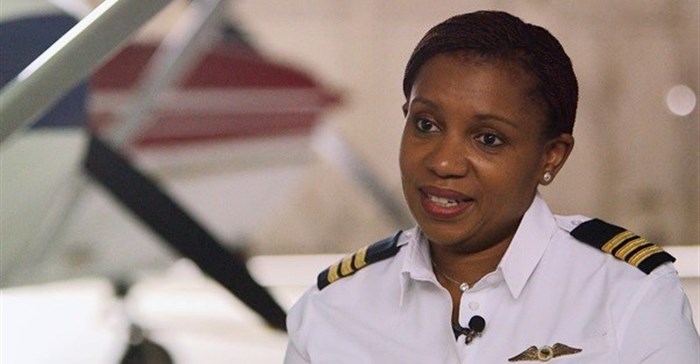CNN Africa Voices recently met, Asnath Mahapa, the first African woman to become a pilot in South Africa.

Asnath Mahapa
Mahapa explains how her love for aeroplanes began at a young age: “At the age of 13 years, I just became fascinated by the idea of flying. It dawned on me that those big things that we see in the skies, someone is actually in charge of them. I thought, if someone can fly those things, that means I can too.”
However, her father wasn’t as enthusiastic about the idea of her becoming a pilot. She followed her father’s wishes and enrolled at the University of Cape Town to study electrical engineering, only to drop out a year later to begin flight school. Mahapa was met with more challenges when she started her training: “I was the only woman in my class the whole time. So I had to work very hard. I had to probably work ten times harder than the men that I was with in the classroom.”
Taking to the skies
In 1998 she took to the skies for her first flight, not realising the significance of her achievements: “I didn’t know I was the first black woman [to be a pilot in South Africa] until 2003. I was still the only one then and I did not know. Before I knew it, I was on TV, the front page of newspapers, and that came as a shock because I was 22 at the time, I was still very young.”
Mahapa is determined to use the media attention responsibly and drive change: “For me, it’s about trying to help women who aspire to become pilots. I still see a lot of black women going through the same things that I went through at that time. They still struggle to get jobs after they qualify. Most struggle with finances because it’s a very expensive industry.”
African College of Aviation
It was this commitment to helping young girls pursue their dreams, that led Mahapa to open the African College of Aviation in 2012. She explains how she hopes the college will benefit future generations: “At the end of the day, I want them to be pilots with confidence and knowing right from wrong – because being a professional pilot means being disciplined.”
Mahapa told Africa Voices what motivates her to run the college: “I don’t think there will ever be enough women in the industry. But if I could change the world, I would tell the boys that they must accept that girls can become anything they want and girls must believe in themselves that they can become anything they want... If, one day, I can say, ‘I have actually touched so many lives and made a difference’, I think that’s when I’ll have peace of mind.”






























